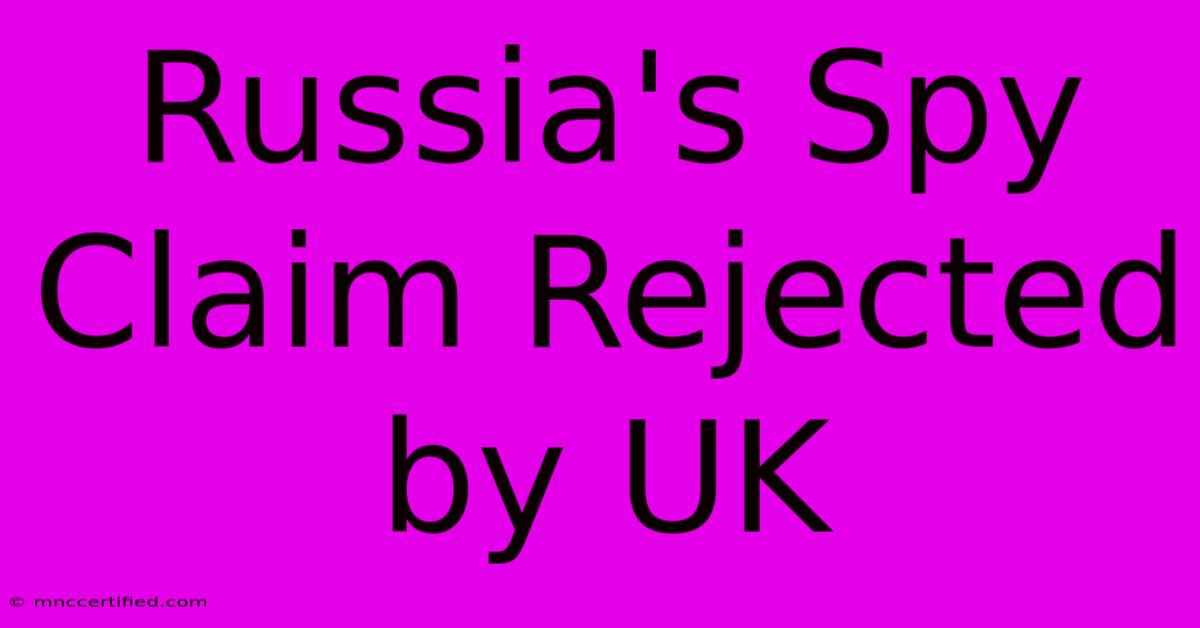Russia's Spy Claim Rejected By UK

Table of Contents
Russia's Spy Claim Rejected by UK: A Deep Dive into the Diplomatic Dispute
The recent accusations leveled by Russia against the United Kingdom, alleging widespread espionage activities, have been swiftly and firmly rejected by the UK government. This high-stakes diplomatic spat highlights the ongoing tensions between the two nations and raises questions about the nature of intelligence operations in the modern era. This article will delve into the details of the claim, the UK's response, and the broader geopolitical implications.
Russia's Allegations: A Lack of Evidence?
Russia's claims, released through state-controlled media outlets, paint a picture of extensive UK-sponsored espionage targeting Russian interests. Specific details, however, remain scarce. The accusations lack the concrete evidence typically associated with such serious allegations. This lack of transparency fuels skepticism within the international community and raises concerns about the motivations behind Russia's pronouncements. Many analysts suspect these claims are part of a broader information warfare campaign aimed at discrediting the UK and deflecting attention from Russia's own alleged activities.
The Timing of the Accusations: A Strategic Move?
The timing of Russia's accusations is also noteworthy. They coincide with [insert relevant geopolitical event or ongoing tension, e.g., increased NATO activity near Russian borders, a new sanctions regime against Russia]. This suggests a possible attempt to shift the narrative and deflect international scrutiny. Such strategic timing is a common tactic in international relations, aiming to manipulate public opinion and influence diplomatic negotiations.
The UK's Rebuttal: A Firm and Defiant Response
The UK government has categorically rejected Russia's accusations, branding them as "baseless" and "disinformation." The Foreign Office issued a statement emphasizing the UK's commitment to upholding international law and respecting the sovereignty of other nations. This firm response underlines the UK's unwillingness to be intimidated by Russia's aggressive rhetoric.
Highlighting Russia's Own History of Espionage
The UK's response has also implicitly highlighted Russia's long and well-documented history of engaging in espionage activities globally. This serves as a powerful counter-narrative, reminding the international community of Russia's own questionable record. By drawing attention to this historical context, the UK aims to weaken the credibility of Russia's current allegations.
Geopolitical Implications: Escalation or De-escalation?
This diplomatic clash adds another layer of complexity to the already strained relationship between Russia and the UK. The potential for further escalation remains a concern, especially given the current geopolitical climate. However, the UK's measured response, focused on factual rebuttal rather than inflammatory rhetoric, suggests a deliberate effort to avoid a full-blown crisis.
The Importance of International Cooperation
The incident underscores the importance of international cooperation in countering disinformation and maintaining stability. The lack of transparency in Russia's claims highlights the need for greater scrutiny of state-sponsored narratives. International bodies and independent fact-checkers play a critical role in verifying information and preventing the spread of misinformation.
Conclusion: Navigating a Complex Landscape
The rejection of Russia's spy claim by the UK represents a significant moment in the ongoing power struggle between the two nations. While the immediate threat of escalation may have subsided, the underlying tensions persist. The incident serves as a stark reminder of the challenges involved in navigating the complex landscape of international relations, where information warfare and strategic communication play an increasingly important role. The ongoing scrutiny of this event will undoubtedly shape future interactions between Russia and the UK, and the wider international community.
Keywords: Russia, UK, espionage, spy, claim, rejected, diplomatic dispute, geopolitical tensions, information warfare, disinformation, international relations, Foreign Office, NATO, sanctions.

Thank you for visiting our website wich cover about Russia's Spy Claim Rejected By UK. We hope the information provided has been useful to you. Feel free to contact us if you have any questions or need further assistance. See you next time and dont miss to bookmark.
Featured Posts
-
Dhl Egypt 10 M 2025 Investment Plan
Nov 27, 2024
-
Best Insurance Adjuster Course
Nov 27, 2024
-
Progressive Insurance Tyler Tx
Nov 27, 2024
-
Dhl Crash Chubb Insurance Involved
Nov 27, 2024
-
Canada Mexico Cooperate After Trump Tariff Threat
Nov 27, 2024